人教版八年级英语上册Units1-10知识点总结
八年级上册英语Units1-10单元知识点归纳
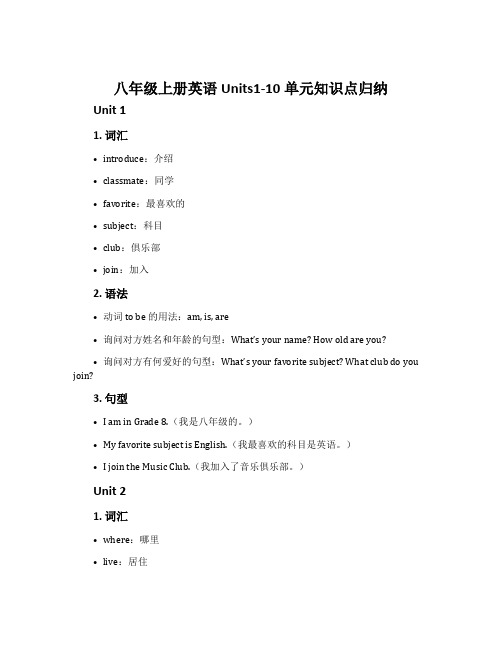
八年级上册英语Units1-10单元知识点归纳Unit 11. 词汇•introduce:介绍•classmate:同学•favorite:最喜欢的•subject:科目•club:俱乐部•join:加入2. 语法•动词 to be 的用法:am, is, are•询问对方姓名和年龄的句型:What’s your name? How old are you?•询问对方有何爱好的句型:What’s your favorite subject? What club do you join?3. 句型•I am in Grade 8.(我是八年级的。
)•My favorite subject is English.(我最喜欢的科目是英语。
)•I join the Music Club.(我加入了音乐俱乐部。
)Unit 21. 词汇•where:哪里•live:居住•city:城市•country:国家•near:靠近•far:远2. 语法•询问对方居住地点的句型:Where do you live? Are you in the city or in the country?•询问对方居住地点是否靠近的句型:Is it near your school?3. 句型•I live in Beijing.(我住在北京。
)•It is in the city.(它在城市里。
)•Yes, it is near my school.(是的,它离我的学校很近。
)Unit 31. 词汇•birthday:生日•when:何时•celebrate:庆祝•presents:礼物•cake:蛋糕2. 语法•询问对方生日的句型:When is your birthday?•询问对方如何庆祝生日的句型:How do you celebrate your birthday?•询问对方生日礼物的句型:What presents do you get?3. 句型•My birthday is on October 10th.(我的生日是十月十日。
人教版八年级英语上册Unit 1--unit 10知识点复习

八年级英语上册知识点复习Unit 1 Where did you go on vacation?1 Did you go anywhere interesting? 不定代词与形容词一起连用,不定代词放在形容词前面,在疑问句中含有some的不定代词要改为含有any的不定代词,但注意在表示请求,推测或希望对方做出肯定回答的疑问句中不变。
但any以及含有any的不定代词表示任何的时候可以用于肯定句。
something new 一些新的东anything different任何不同的东西somebody,someone,anybody,anyone, nobody,everybody,everyone指人somewhere,anywhere,nowhere,everywhere指地点something,somebody,someone,somewhere用于肯定句及表示请求或建议的疑问句中,而anything,anybody,anyone,anywhere用于否定句、疑问句及条件状语从句中。
如:Did you do anything interesting? 你做了有趣的事吗?(表疑问)Why don‘t you visit someone with me?(表建议)If anything happens, please tell me.Can I ask you ________ questions?A someB anyC littleD somethingIs there ____________ new in the newspaper?A somethingB anythingC nothingD everything2 I bought something for my father.buy sth for sb/ buy sb sth.为某人买某物过去式: boughtMy father bought me a cat.My uncle_____ _____a bike.= My uncle_____ _____for me.3 study for为什么做准备prepare for我将为期末考试做准备。
人教版八年级英语上册unit1-10知识点总结

知识点8上unit1paragliding n.滑翔伞运动trader n.商人visit sb 看望某人visit sp 游览某地visitor 游客anyone=anybody 有人,任何人否定,疑问句代替someone/somebody肯句:任何人anyone 指人不指物后不接ofany one指人/物“任何一个”后可接of短语anyone做主,谓动单Anyone in my class knows any one of the singers and any one of their songs.adj.修饰不定代要后置anything special作定adj./to do 放在复合不定代词后复合不定代词作主语,谓语动词用单数some-肯定句any-否,疑。
疑中希望得到肯定回答用some-。
肯定句anyone任何人anything任何事接双宾buy sb. Sth.动词间宾直宾buy sth. to sb,直宾间宾直宾的代词只能用有to的形式give tell sell bring send pass show teachsend...to... 把...寄给... send for 派人去请You should send for a doctor.take a photo/photos of sb./sth. quite a few 相当多修饰cn. quite a little un.a little 修饰un./v./adj./adv.too many 修饰cn.复"太多" too much 修饰un. 修饰v.作状“太多”much too 修饰adj./adv."太" most of the time 大部分时间most of...做主谓看most of 后n./pronmost of us are...Most of the food goes bad.have a good time doing sth.How do you like =How do you feel about =What do you think ofgo sightseeing 去观光go surfing 去冲浪go skateboarding 去进行滑板运动go online 去上网(U2)Sometimes I go online for fun.有时我上网娱乐。
人教版八年级英语上册1-10单元学霸笔记
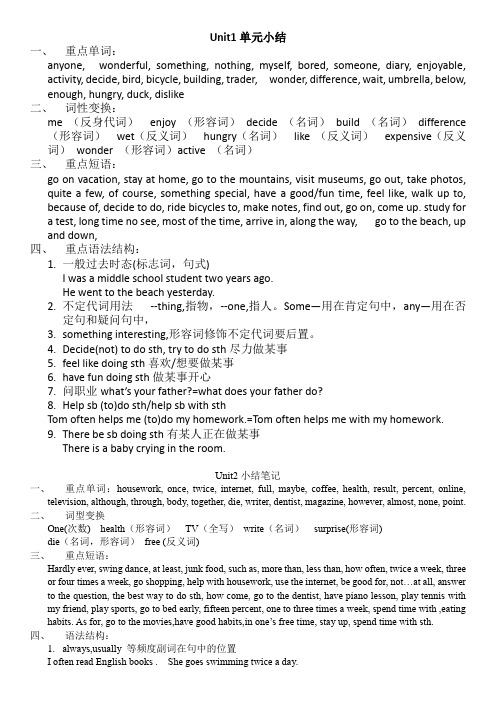
Unit1单元小结一、重点单词:anyone, wonderful, something, nothing, myself, bored, someone, diary, enjoyable, activity, decide, bird, bicycle, building, trader, wonder, difference, wait, umbrella, below, enough, hungry, duck, dislike二、词性变换:me (反身代词)enjoy (形容词)decide (名词)build (名词)difference (形容词)wet(反义词)hungry(名词)like (反义词)expensive(反义词)wonder (形容词)active (名词)三、重点短语:go on vacation, stay at home, go to the mountains, visit museums, go out, take photos, quite a few, of course, something special, have a good/fun time, feel like, walk up to, because of, decide to do, ride bicycles to, make notes, find out, go on, come up. study fora test, long time no see, most of the time, arrive in, along the way, go to the beach, upand down,四、重点语法结构:1.一般过去时态(标志词,句式)I was a middle school student two years ago.He went to the beach yesterday.2.不定代词用法--thing,指物,--one,指人。
人教版八年级上册英语Units1-10单元知识点归纳

榕江县心灵英语培训教材第1页八年级上册英语Units1—10单元知识点归纳 Unit1 Where did you go on vacation?go on vacation 去度假 stay at home 待在家里 go to the mountains 去爬山 go to the beach 去海滩visit museums 参观博物馆 go to summer camp 去参观夏令营 quite a few 相当多 study for 为……而学习go out 出去 most of the time 大部分时间 taste good 尝起来很好吃 have a good time=have fun 玩得高兴 +v 。
ing of course 当然 feel like 给……的感觉;感受到go shopping 去购物 in the past 在过去 walk around 四处走走 because of 因为 one bowl of … 一碗…… the next day 第二天 drink tea 喝茶 find out 找出;查明 go on 继续 take photos 照相 something important 重要的事 up and down 上上下下 come up 出来 buy sth. for sb 。
/ buy sb 。
sth.为某人买某物taste + adj 。
尝起来…… look+adj 。
看起来…… nothing …but+动词原形 除了……之外什么都没有 seem+(to be )+ adj 。
看起来…… arrive in+大地点 / arrive at+小地点 到达某地 decide to do sth 。
决定去做某事try doing sth 。
尝试做某事 / try to do sth.尽力去做某事 forget doing sth.忘记做过某事/ forget to do sth.忘记做某事 enjoy doing sth 。
人教版八年级英语上册笔记1--10单元
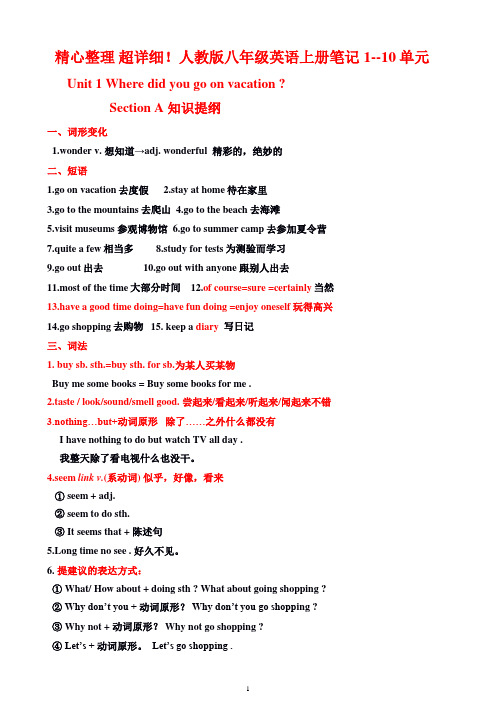
精心整理超详细!人教版八年级英语上册笔记1--10单元Unit 1 Where did you go on vacation ?Section A 知识提纲一、词形变化1.wonder v. 想知道→adj. wonderful 精彩的,绝妙的二、短语1.go on vacation去度假2.stay at home待在家里3.go to the mountains去爬山4.go to the beach去海滩5.visit museums 参观博物馆6.go to summer camp去参加夏令营7.quite a few相当多 8.study for tests为测验而学习9.go out出去 10.go out with anyone 跟别人出去11.most of the time大部分时间 12.of course=sure =certainly当然13.have a good time doing=have fun doing =enjoy oneself玩得高兴14.go shopping去购物 15. keep a diary 写日记三、词法1. buy sb. sth.=buy sth. for sb.为某人买某物Buy me some books = Buy some books for me .2.taste / look/sound/smell good. 尝起来/看起来/听起来/闻起来不错3.nothing…but+动词原形除了……之外什么都没有I have nothing to do but watch TV all day .我整天除了看电视什么也没干。
4.seem link v.(系动词) 似乎,好像,看来① seem + adj.② seem to do sth.③ It seems that + 陈述句5.Long time no see . 好久不见。
6. 提建议的表达方式:① What/ How about + doing sth ? What about going shopping ?②Why don’t you + 动词原形?Why don’t you go shopp ing ?③ Why not + 动词原形? Why not go shopping ?④Let’s + 动词原形。
新人教版八年级上册英语Units1-10单元知识点
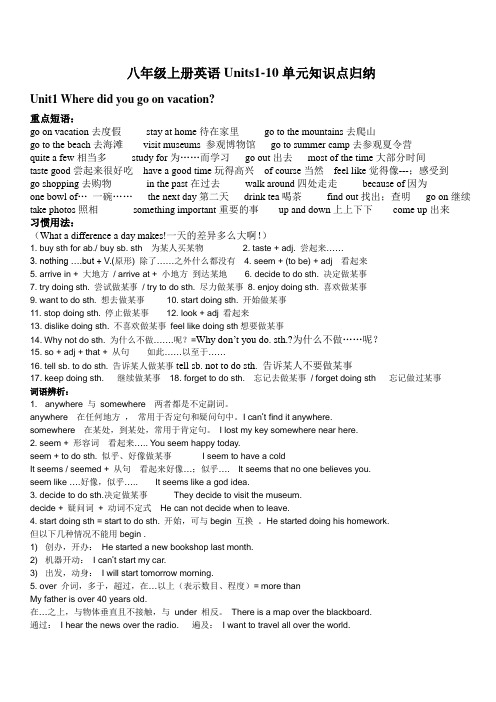
八年级上册英语Units1-10单元知识点归纳Unit1 Where did you go on vacation?重点短语:go on vacation去度假stay at home待在家里go to the mountains去爬山go to the beach去海滩visit museums 参观博物馆go to summer camp去参观夏令营quite a few相当多study for为……而学习go out出去most of the time大部分时间taste good尝起来很好吃have a good time玩得高兴of course当然feel like觉得像---;感受到go shopping去购物in the past在过去walk around四处走走because of因为one bowl of…一碗……the next day第二天drink tea喝茶find out找出;查明go on继续take photos照相something important重要的事up and down上上下下come up出来习惯用法:(What a difference a day makes!一天的差异多么大啊!)1. buy sth for ab./ buy sb. sth 为某人买某物2. taste + adj. 尝起来……3. nothing ….but + V.(原形) 除了……之外什么都没有4. seem + (to be) + adj 看起来5. arrive in + 大地方/ arrive at + 小地方到达某地6. decide to do sth. 决定做某事7. try doing sth. 尝试做某事/ try to do sth. 尽力做某事8. enjoy doing sth. 喜欢做某事9. want to do sth. 想去做某事10. start doing sth. 开始做某事11. stop doing sth. 停止做某事12. look + adj 看起来13. dislike doing sth. 不喜欢做某事feel like doing sth想要做某事14. Why not do sth. 为什么不做…….呢?=Why don’t you do. sth.?为什么不做……呢?15. so + adj + that + 从句如此……以至于……16. tell sb. to do sth. 告诉某人做某事tell sb. not to do sth. 告诉某人不要做某事17. keep doing sth. 继续做某事18. forget to do sth. 忘记去做某事/ forget doing sth 忘记做过某事词语辨析:1. anywhere 与somewhere 两者都是不定副词。
人教英语八年级上册第一单元至第十单元知识点、重点笔记

Unit 1 where did you go on vacationImportant phrases: (重点短语)1.去夏令营2.买一些特别的东西3.为考试准备4.跟某人外出5.去纽约市6.好久不见7.度假 8.去某个有趣的地方 9.大多数时间10.给母鸡喂食 11.除—一无所有 12.当然,自然13.似乎有点无聊 14记日记 15.令人愉快地活动16.到达 17.决定去海边 18.尝试滑翔伞运动19.感觉像一只小鸟 20.想要骑车 21.中国商人的房子22.在过去 23许多古老的建筑 24步行到山顶25.开始下雨 26.等了一个多小时的火车 27.下大雨28.忘记带一把雨伞 29.又湿又冷 30.因为恶劣的天气31.带着足够的钱 32.足够大 33.好像有点饿34.与—一样好 35 不如----好 36.照了相当多的相片37.停下来喝水 38.继续前进 39.激动地跳跃40.二十分钟后 41.如此---以至于 42.升起43.发现-- 44.尝起来很好吃 45.尽力去做某事46.停止做某事 47.不喜欢做某事 48.继续做某事49.一碗米饭 50为某人买某物重点句子where did you go on vacationgo on vacation 去度假2.Visited my uncle重点:visit为及物动词,“拜访,探望,参观,游览”后接人或地点改错Did you visit in china3. Did you buy anything special1)buy 的过去式为boughtbuy sb.=buy sb sth.我为Tom买了一个礼物2)anything 不定代词“某物,某事”主要用于疑问句和否定句中一旦anything用于可定句中,则意为“任何事,任何东西”Eg You can ask me anything you want to know3)★形容词修饰不定代词要后置,did you go anything interesting这是一般过去时中不含was/were的句子在变一般疑问句时,需用助动词did。
人教版八年级上册英语期末复习全册 Unit 1-Unit 10 单元知识点总结汇编

人教版八年级上册英语期末复习全册Unit 1-Unit 10单元知识点总结汇编Unit 1 Where did you go on vacation?知识点1.Where 在哪里?用来询问地点或场所,用于句首,其后跟一般疑问句例:Where are you from?Where does he live?2.go on vacation 去度假vacation [və'keɪʃn] n假期= holidayon vacation 在度假take a vacation 去度假winter vacation 寒假summer vacation 暑假例:He will go on vacation with his family. 他要和家人一起度假3.visited 拜访;探望;参观;游览后接表示人的名词或代词例:I visited my grandmother last week. 上周我去拜访了我的外婆。
Do you want to visit Shanghai? 你想游览上海吗?visitor参观者;游客例:These visitors come from America.4. take photos 照相;拍照例:Could you help me take some photos? 你能帮我拍几张照片吗?5. quite a few与quite a littlequite a few 相当的;不少修饰可数名词复数quite a little 相当的;不少修饰不可数名词few / a few little / a little辨析6. myself 我自己反身代词(1)反身代词的构成◆一、二人称的反身代词构成:形容词性物主代词+self/selves构成◆第三人称的反身代词构成:第三人称宾格+self/selves(2)反身代词的常见搭配:enjoy oneself=have fun =have a good time玩得高兴teach oneself=learn …by oneself 自学by oneself =alone 独自help oneself to 随便吃introduce oneself to 自我介绍7. relax →relaxed adj 感到轻松的,自在的→relaxing adj. 令人放松的be relaxed about 对……感到放松8. taste good 尝起来很好吃taste 尝起来其后接形容词构成系表结构。
人教版英语八年级上册unit110知识点总结强大

Unit 1 Where did you go on vacation?一、词组、短语:1、go on vacation去度假2、stay at home 呆在家3、go to the mountains 上山/进山4、go to the beach到海边去5、visit museums 参观博物馆6、go to summer camp 去夏令营7、quite a few 相当多8、study for为……学习9、go out 出去10、most of the time 大部分时间/绝大多数时11、taste good 尝起来味道好12、have a good time玩的开心13、of course当然可以14、feel like感觉像……/想要15、go shopping购物16、in the past 在过去17、walk around绕……走18、too many 太多(可数名词前面)19、because of 因为20、one bowl of 一碗……21、find out 查出来/发现22、go on继续23、take photos 照相24、something important重要的事情25、up and down上上下下26、come up出来二、重要句子(语法):家度去度假了。
三、习惯用法、搭配1. buy sth. for ab./ buy sb. sth. 为某人买某物2. taste + adj. 尝起来……3. nothing ….but + V.(原形) 除了……之外什么都没有There was nothing much to do in the evening but read.晚上除了读书以外无事可做。
4. seem + (to be) + adj 看起来5. arrive in + 大地方/ arrive at + 小地方到达某地6. decide to do sth. 决定做某事7. try doing sth. 尝试做某事/ try to do sth. 尽力做某事8. enjoy doing sth. 喜欢做某事9. want to do sth. 想去做某事10. start doing sth. 开始做某事11. stop doing sth. 停止正在做的某事12. look + adj 看起来13. dislike doing sth. 不喜欢做某事14. Why not do sth. 为什么不做…….呢?15. so + adj + that + 从句如此……以至于……16. tell sb. (not) to do sth. 告诉某人(不要)做某事17. keep doing sth. 继续做某事18. forget to do sth. 忘记去做某事/ forget doing sth 忘记做过某事四、词语辨析:1.anywhere 及somewhere 两者都是不定副词。
人教版八年级上册英语Unit 1-10 语法归纳总结
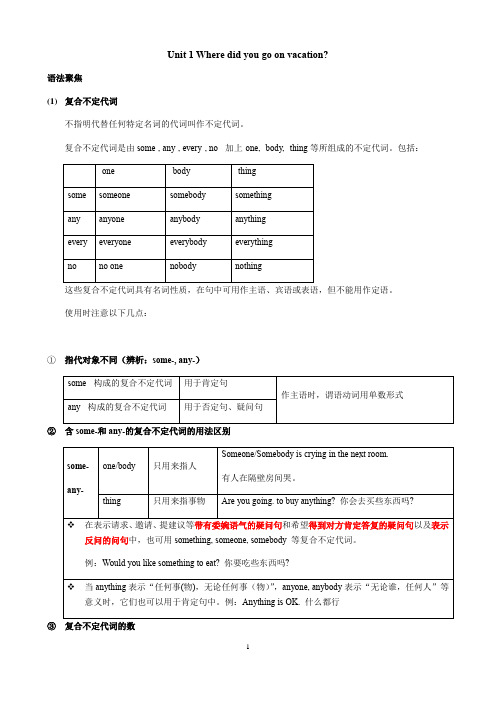
Unit 1 Where did you go on vacation?语法聚焦(1)复合不定代词不指明代替任何特定名词的代词叫作不定代词。
复合不定代词是由some-, any-, every-, no-加上-one, -body, -thing等所组成的不定代词。
包括:这些复合不定代词具有名词性质,在句中可用作主语、宾语或表语,但不能用作定语。
使用时注意以下几点:①指代对象不同(辨析:some-, any-)②含some-和any-的复合不定代词的用法区别③复合不定代词的数❖复合不定代词都具有单数的含义,当它们充当句子的主语时,其后的谓语动词用单数形式。
例:Is everyone here today? 今天每个人都到了吗?Nothing is difficult if you put your heart into it. 世上无难事,只怕有心人。
④复合不定代词的定语需后置,即放在复合不定代词的后面。
例:Can you tell something interesting? 你能讲些有趣的事情吗?(2)一般过去时(I)①一般过去时的用法一般过去时用来描述过去发生的动作或存在的状态。
常和一般过去时搭配的标志性的时间状语有yesterday, last week, in the past等。
例:They stayed at home yesterday. 昨天他们待在家里。
②一般过去时的三种句式结构:③一般过去时的句式变化❖be动词的一般过去时的句式变化❖there be句型的一般过去时的句式变化:❖行为动词的一般过去时的句式变化④动词的过去式的变化规律包括规则变化和不规则变化两种。
❖规则变化通常以-ed结尾。
具体如下:❖不规则变化的动词有许多,常见的有:(3)一般过去时(II)侧重行为动词的一般过去时的特殊疑问句①对人物进行提问时有两种情况:②对事件、时间、地点、方式等进行提问时,结构为:特殊疑问词+did+主语+动词原形+其他?❖What did he do last night? 昨天晚上他做什么了? (事件)❖When did you meet Lisa? 你是什么时候遇到莉萨的?(时间)❖Where did you go last weekend?上周末你们去哪里了?(地点)❖How did you get to Beijing? 你是怎么到北京的? (方式)❖Why did you want to visit China? 你为什么想去游览中国?(原因)Unit 2 How often do you exercise?语法聚焦❖频度副词:表示动作频率的副词辨析:always, usually, often, sometimes, seldom, neverUnit 3 I’m more outdoing than my sister.语法聚焦:形容词和副词比较级的基本用法大多数形容词(性质形容词)和副词有比较级的变化,用来表示事物的等级差别。
新人教版八年级上册英语Units1-10各单元知识点归纳(全册)
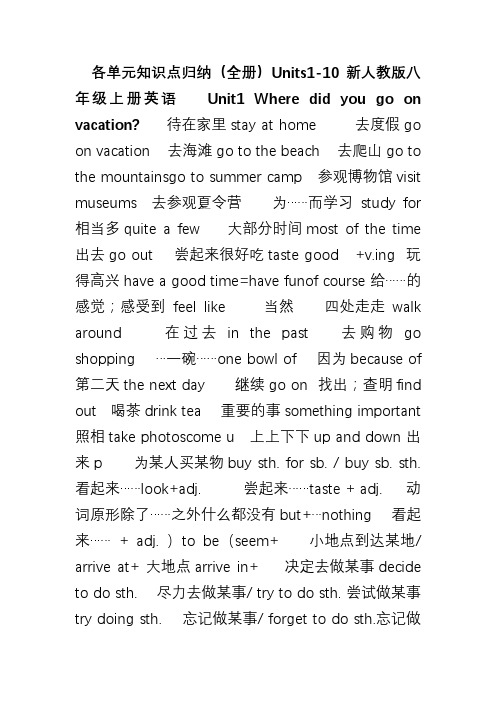
各单元知识点归纳(全册)Units1-10新人教版八年级上册英语 Unit1 Where did you go on vacation? 待在家里stay at home 去度假go on vacation 去海滩go to the beach 去爬山go to the mountainsgo to summer camp 参观博物馆visit museums 去参观夏令营为……而学习study for 相当多quite a few 大部分时间most of the time 出去go out 尝起来很好吃taste good +v.ing 玩得高兴have a good time=have funof course 给……的感觉;感受到feel like 当然四处走走walk around 在过去in the past 去购物go shopping …一碗……one bowl of 因为because of 第二天the next day 继续go on 找出;查明find out 喝茶drink tea 重要的事something important 照相take photoscome u 上上下下up and down 出来p 为某人买某物buy sth. for sb. / buy sb. sth. 看起来……look+adj. 尝起来……taste + adj. 动词原形除了……之外什么都没有but+…nothing 看起来…… + adj. )to be(seem+ 小地点到达某地/ arrive at+ 大地点arrive in+ 决定去做某事decide to do sth. 尽力去做某事/ try to do sth. 尝试做某事try doing sth. 忘记做某事/ forget to do sth.忘记做过某事forget doing sth. 想去做某事want to do sth. 喜欢做某事enjoydoing sth. 开始做某事start doing sth. 停止做某事stop doing sth. 继续做某事keep doing sth. 不喜欢做某事dislike doing sth. 状态…保持…使keep sth+adj. 为什么不做……呢?Why not +v.?=Why don’t you+v.? 句如此……以至于……从so+adj.+that+告诉某人(不要)做某事tell sb. (not) to do sth. …想要做…想要feel like +n./v.ing sth 单元强化练习:一、根据句意,用所给单词的适当形式填空。
Unit 1-10 单元重要知识点梳理 2022-2023学年人教版英语八年级上册

Unit 1-10 单元重要知识点梳理2022-2023学年人教版英语八年级上册八上新目标1-10重要知识点1.a university an actor/an engineer/an actress/an umbrella something + 形容词,形容词放在不定代词之后形容词+ enough,形容词放在enough之前enough time ,enough 通常放在名城前面。
2.less 后面跟不可数名词/ fewer 后面跟可数名词复数。
都表示更少的意思。
more即可以跟不可数名词,也可以跟可数名词复数3.careless粗心/careful细心,carefully ,副词,细心地4.be good at doing 擅长做某事,at 介词后面跟doing5.hear from 接到某人的信6.turn down an invitation 拒绝邀请,make an invitation 发出邀请,accept an invitation 接受邀请,refuse an invitation 拒绝邀请7.if ,表示如果意思,条件状语从句,主将从现。
If it rains,I will stay at home.If it doesn't rain.I will go shopping.8.unless 除非,如果不You won't get good grades unless you study harder.9.take some medicine 吃药10.Must.... Yes,you must.....,you needn't....11.hundreds of ,hundred前面无具体数字后面加s,加of.hundred前面有具体数字后面不加s,加of.12.take up a hobby 开始学习一项爱好13.how many后面跟可数名词复数/how much后面跟不可数名词14.one....the other....,一个...另一个(共2个)15.on Sunday在具体某一天用介词on16.how soon与将来时态连用,表示多快,多久/how long多长时间/how often多久一次17.one of+最高级+可数名词复数18.be available 有空的19.some advice 一些建议,advice 是不可数名词20.there will be../there is going to....将要有21.because of...后面跟名词,because 后面跟句子22.something special ,形容词放在不定代词之后23.look forwards to doing 盼望做某事24.a cup of yogurt 一杯酸奶three cups of yogurt25.play well(副词修饰动词) good/well (比较级)--better26.cut them up/(turn it/them on)/(turn it/them off,)代词放在动词短语中间27.look after oneself 照看自己/ keep ....to oneself 保守秘密28. 祈使句:动词原形+其他...Don't +动词原形+其他....29.Can you.... -Sure.I'd love to./I'm sorry.I can't.I have to/must.../I'm afraid not.30.a symbol of... ,...的象征31.on the morning of July 3rd/on Sunday morning32.what else 其他什么/something else 其他事情33. hope to do/promise to do /expect to do /need to do/decide to do /refuse to do34.an exciting event/an actor engineer/an article 只要首字母发元音,用冠词an35.I'd love to 我愿意would like to do36.turn on 打开turn off 关上turn up 调大turn down调小,拒绝37.as long as 只要38.talk less, does more 少说多做39.although虽然.与but 不能同时用在一个句子中40.on April 21,2023/on May 12th/on the morning of 12th December41.play a part in doing 参与做某事42.keep doing一直做某事/enjoy doing喜欢做某事/practice doing 练习做某事43.an 11-year-old (8,18/80)...., play the drums敲鼓44.take up doing 开始做某事45.be unlucky 不幸,luckily46.as...as 中间是形容词或者副词原级47.by oneself 独自48.-er and -er ,hotter an hotter,越来越冷more and more beautiful 越来越漂亮the+比较级...,the +比较级....越....,越....49.never/not .....until 直到...才50.turn it down/turn it on/cut them up 代词分放中间51.look after 照看52.arrive in 到达打大地方arrive at 到达小地方53.of all.../of the three/in ...最高级标志54.accept the invitation接受邀请/ make an invitation发出邀请/refuse the invitation拒绝邀请55.without +名词/without doing 没有做某事56.another time 另外时间57.even/much修饰比较级/比较级标志than58.too...to..太..而不能/so...that...如此...以至于59.take a trip to...去..旅行60.even/ much 后面跟比较级serve--(名词)service61.two cups of milk 2杯牛奶62.What's the date today It's December 12th.63.What's the day today It's December 12th.64.I'm afraid not.我恐怕不能65.be talented in在某方面有天赋66.make up 编造67.what else其他什么68.in.../of.... 最高级69.What do you think of.... =How do you like ...你认为..怎么样70.although..虽然.71. another三者或者三者以上另外一个one....the other一个...另一个/the others其他人/other....其他的,后面跟复数/any other其他任何一个,后面跟可数名词单数72.maybe可能,副词,后面跟句子/may be 可能是,在句子中做谓语73.probably可能/certainly当然74.boring修饰事物/bored修饰人75.take acting/dancing/singing lessons76.send...to把...送给/bring ...to..把...带到77.seem impossible似乎不可能78.be like 像..../like喜欢79.forget to do 忘记去做,还没有做/remember to do记着去做,还没有做80.look for 寻找,动作,表示过程/find..找到,表示结果/find out 找出事情的原因或真相81.something important 形容词放在不定代词后面82.experience 经验,不可数83.another time 另外时间84.Can I.... -Sure. but you must....85.the+比较级....,the +比较级.... 越....,越....86.What +a/an +形容词+名词+主语+谓语。
人教版八年级英语上册Units1-10知识点总结
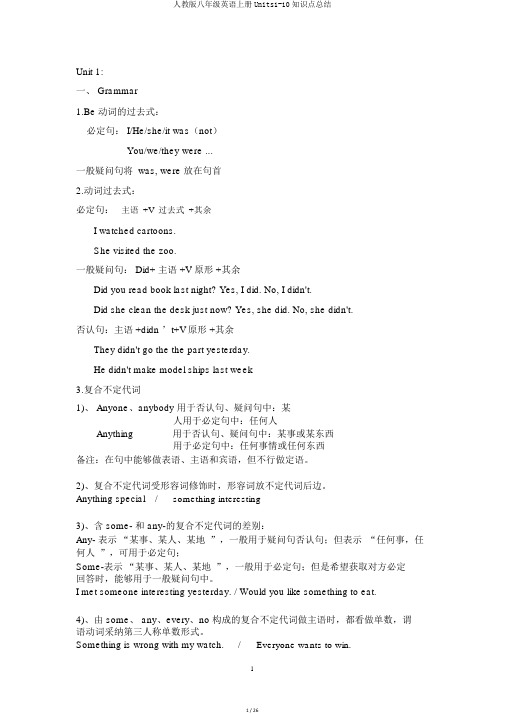
Unit 1:一、 Grammar1.Be 动词的过去式:必定句: I/He/she/it was(not)You/we/they were ...一般疑问句将 was, were 放在句首2.动词过去式:必定句:主语+V过去式+其余I watched cartoons.She visited the zoo.一般疑问句: Did+ 主语 +V 原形 +其余Did you read book last night? Yes, I did. No, I didn't.Did she clean the desk just now? Yes, she did. No, she didn't.否认句:主语 +didn ’t+V原形 +其余They didn't go the the part yesterday.He didn't make model ships last week3.复合不定代词1)、 Anyone、anybody 用于否认句、疑问句中:某人用于必定句中:任何人Anything用于否认句、疑问句中:某事或某东西用于必定句中:任何事情或任何东西备注:在句中能够做表语、主语和宾语,但不行做定语。
2)、复合不定代词受形容词修饰时,形容词放不定代词后边。
Anything special /something interesting3)、含 some- 和 any-的复合不定代词的差别:Any- 表示“某事、某人、某地”,一般用于疑问句否认句;但表示“任何事,任何人”,可用于必定句;Some-表示“某事、某人、某地”,一般用于必定句;但是希望获取对方必定回答时,能够用于一般疑问句中。
I met someone interesting yesterday. / Would you like something to eat.4)、由 some、 any、every、no 构成的复合不定代词做主语时,都看做单数,谓语动词采纳第三人称单数形式。
人教版八年级上册英语Units1-10重点短语句型汇总

八年级上册英语Units1-10单元知识点归纳Unit1 Where did you go on vacation?go on vacation去度假stay at home待在家里go to the mountains去爬山go to the beach去海滩visit museums 参观博物馆go to summer camp去参观夏令营quite a few相当多study for为……而学习go out出去most of the time大部分时间taste good尝起来很好吃have a good time=have fun玩得高兴+v.ing of course当然feel like给……的感觉;感受到go shopping去购物in the past在过去walk around四处走走because of因为one bow of…一碗……the next day第二天drink tea喝茶find out找出;查明go on继续take photos照相something important重要的事up and down上上下下come up出来taste + adj. 尝起来……look+adj. 看起来……nothing…but+动词原形除了……之外什么都没有seem+(to be)+ adj. 看起来………保持…状态Why not +v.?=Why don’t you+v.?为什么不做……呢?so+adj.+that+从句如此……以至于……tell sb. (not) to do sth. 告诉某人(不要)做某事feel like +n./v.ing sth 想要…想要做…Unit2 How often do you exercise?help with housework帮助做家务on weekends在周末how often多久一次hardly ever几乎从不once a week每周一次twice a month每月两次every day每天be free有空go to the movies去看电影use the Internet用互联网swing dance摇摆舞play tennis 打网球stay up late熬夜;睡得很晚at least至少have dance and piano lessons上舞蹈课和钢琴课go to bed early早点睡觉play sports进行体育活动be good for对……有好处go camping去野营not…at all一点儿也不……in one’s free time在某人的业余时间the most popular最受欢迎的such as比如;诸如old habits die hard积习难改go to the dentist去看牙医more than多于;超过less than少于help sb. with sth.帮助某人做某事How about+n./v.ing? ......怎么样?/ ……好不好?want sb. to do sth.想让某人做某事How many+可数名词复数+一般疑问句?……有多少……? 主语+find+that从句. ……发现……It’s+ adj.+ to do sth. 做某事的……X|k |B| 1 . c by doing sth. 通过做某事leave for…动身去某地What’s your favorite……?你最喜爱的………的最好方式Unit3 I’m more outgoing than my sister.more outgoing更外向as…as…与……一样…… the singing competi tion唱歌比赛be similar to与……相像的/类似的the same as和……相同;与……一致be different from与……不同care about关心;介意be like a mirror像一面镜子the most important最重要的as long as只要;既然bring out使显现;使表现出get better grades取得更好的成绩reach for伸手取in fact事实上;实际上make friends交朋友the other 其他的touch one’s heart感动某人be talented in music有音乐天赋be good at擅长…… be good with善于与……相处have fun doing sth.享受做某事的乐趣be good at doing sth擅长做某事make sb. do sth.让某人做某事want to do sth.想要做某事as+adj./adv.的原级+as 与……一样……It’s+ adj.+for sb. to do sth. 对某人来说,做某事……的。
- 1、下载文档前请自行甄别文档内容的完整性,平台不提供额外的编辑、内容补充、找答案等附加服务。
- 2、"仅部分预览"的文档,不可在线预览部分如存在完整性等问题,可反馈申请退款(可完整预览的文档不适用该条件!)。
- 3、如文档侵犯您的权益,请联系客服反馈,我们会尽快为您处理(人工客服工作时间:9:00-18:30)。
Unit 1:一、Grammar1.Be 动词的过去式:肯定句:I/He/she/it was(not)…You/we/they were ...一般疑问句将was, were 放在句首2.动词过去式:肯定句:主语+V过去式+其他I watched cartoons.She visited the zoo.一般疑问句:Did+主语+V原形+其他Did you read book last night? Yes, I did. No, I didn't.Did she clean the desk just now? Yes, she did. No, she didn't.否定句:主语+didn’t+V原形+其他They didn't go the the part yesterday.He didn't make model ships last week3.复合不定代词1)、Anyone、anybody 用于否定句、疑问句中:某人用于肯定句中:任何人Anything 用于否定句、疑问句中:某事或某东西用于肯定句中:任何事情或任何东西备注:在句中可以做表语、主语和宾语,但不可做定语。
2)、复合不定代词受形容词修饰时,形容词放不定代词后面。
Anything special / something interesting3)、含some- 和any-的复合不定代词的区别:Any-表示“某事、某人、某地”,一般用于疑问句否定句;但表示“任何事,任何人”,可用于肯定句;Some-表示“某事、某人、某地”,一般用于肯定句;但是期望得到对方肯定回答时,可以用于一般疑问句中。
I met someone interesting yesterday. / Would you like something to eat.4)、由some、any、every、no构成的复合不定代词做主语时,都看做单数,谓语动词采用第三人称单数形式。
Something is wrong with my watch. / Everyone wants to win.5)、Too many + 可数名词复数;Too much + 不可数名词;Much too + adj./adv二、Vocabulary & Phrases待在家: stay at home去海滩:go to the beach去爬山:go to the mountains拜访我的老师:visit my teacher 去度假:go on vacation参观博物馆:visit museum去夏令营:go to summer camp 为某人买某物:buy sth for sb / buy sb sth当然:of course没事可做除了...:nothing to do but do... 似乎做某事:seem to do到达:arrive in/at; get to; reach决定做某事:decide to do sth 做决定:make a decision尽力做某事:try to do sth尝试做某事:try doing sth在过去:in the past喜欢做某事:enjoy doing sth 到处走走:walk around 因为,由于:because of拍照:take photos沿途:along the way等待某人:wait for sb如此...以至于...:so...that... 上上下下:ups and downs 尝起来美味: taste delicious相当多:quite a fewUnit 2一、How often: “多久一次”;用来提问频率,常用always,usually, often,sometimes, once, twice来回答。
How soon: “多久”;常用in+时间来回答,多用于将来时;How lo ng: “多长时间”;常用for+时间段或since +过去某个时间点来回答,常用在现在完成时;How far: “多远”;提问距离How many: 提问数量的多少,常跟可数名词复数How much: 提问数量的多少,常跟不可数名词二、Be good for sb/sth 对...有益/好处Be good at sth/doing sth 擅长某物或做某事Be good with sb 擅长与某人打交道Be good to sb 对某人友善三、Spend/cost/take/pay 的区别:1.人+spend time with sb 花时间陪伴某人;人+ spend money on sth 花钱在某事上;人+ spend time/money (in) doing sth 花时间金钱做某事Spend 的主语一定是人2.It takes sb some time/money to do sth. 花费某人时间/金钱做某事3.Pay 的主语必须是人,sb pay some money for sth. 花钱买某物4.Cost 的主语必须是物,sth cost sb some money. 某物花了某人多少钱四、some time/ some times/ sometime/sometimes 区别(1)sometimes为副词,意思为“有时”,可用于句首、句中或句末,在句中作状语。
例如:Sometimes he goes to the cinema on Sunday.星期天他有时去看电影。
(2)some times是词组,意思为“几次,几倍”,其中的times为可数名词的复数形式。
例如:He has been to Beijing for some times before.他以前去过北京几次。
(3)sometime指某个不明确的时间,意思为“某个时候”。
例如:We’ll take our holiday sometime in August.我们将在八月的某个时候度假。
(4)some time指某一段时间,其中的time为不可数名词,意思为“时间”。
例如:I spend some time practicing speaking English every day.我每天花一些时间练习说英语。
五、Other, others, the other, the others, another 区别(1)another指不定数目中的“另一个,又一个(三个以上)”,用来代替或修饰单数可数名词.例如:This sweater is too big for me. Could you show me another one?.(2)other意思是“另外的,其他的”,修饰复数名词.例如:What other animals do you like?(3)the other通常指两个中的“另一个”常组成词组“one...the other...”.例如:She has two daughters.One is a teacher;the other is a doctor.(4)others泛指“另外的人或物”.例如:Some people like swimming,and others like boating.(5).the others特指某范围内的“其余全部的人或物”.例如:There are forty books in the box.Ten are mine,and the others are my father’s.六、although, though 区别(1). 做连词,表示“虽然”,两者大致同义,可换用,只是although 比though 更为正式:Though [Although] it was raining,we went there.(2). although 一般不用作副词,而though 可用作副词,且一般放在句末(不放在句首),意为“可是”、“不过”:It’s hard work; I enjoy it though.(3).在as though(好像,仿佛),even though(即使,纵然)等固定短语中不能用although:She was always afraid of men,even though she had lots of boyfriends.七、Grammar & Vocabularies一周两次:twice a week熬夜不睡:stay up late至少:at least一点也不:not...at all四到六次:four to six times做某事最好的方法:the best way to do sth例如:such as问题的答案是:answer to question最受欢迎的:the most popular保持健康:keep healthy 多于:more than少于:less than百分之...:percent of...结果是...:as a result起因于...,由...造成:result from 上网:go online/ surf the Internet 几乎从不:hardly ever空闲的:be free做家务:do housework/chores记住:keep in mindUnit 3一、比较级:(一)、比较级,最高级变化规则一般在词尾+ er或est;以e 结尾的加r或st;重读闭音节双写辅音字母+ er或est;辅音字母+y结尾的,改y为i+ er或est;多音节词和部分双音节词,加more 或most。
(二)、比较级用法基本句型:主语+be/实义动词+adj./adv.比较级+than+被比较对象1. 两者相比较用比较级eg:Who do you think is more outgoing,Lily or Lucy?2. Very, more, quite, so,too等修饰原级;much, a little, a lot, a bit, far, even等修饰比较级eg:I’m much/ a little / a lot / a bit /far more outgoing than my sister.I’m even worse now.3. 不能与人或事物自身相比较eg:He is taller than any other student in his class.China is larger than any country in Africa.4. 比较对象要一致(that代替不可数名词,those代替可数名词复数,所有格,ones)eg:The weather in Harbin is much colder than that in Wuhan.The students of Class One study harder than those of Class Two.My bike i s newer than Tom’s.5. 比较级中出现of the two/ twins结构时,adj比较级前要+the,不可用than Eg:Tom is the taller of the two brothers.6. “get/ become+ 比较级+and +比较级”表示“变得越来越...”(多音节或部分双音节用“more and more+原级)Eg: It gets warmer and warmer when spring comes.You’r e getting more and more beautiful.7. “the+比较级,the+比较级”表示“越...,就越...”Eg: The more you exercise, the stronger you will be.8. “As...as”中间接原级,表示“与...一样”,否定为“not as/ so...as”表示“不如” Eg: He is as tall as his father. He is not as/ so tall as his father.9. 比较级+than”(more/ less +原级+than)与“not as/ so…as”可以互换Eg: I’m taller than you. / You’re shorter than me. / You’re not as/ so tall as me. Chinese is more important than Biology.Biology is less important than ChineseBiology is not as/ so important as Chinese10. 比...大/多/长/宽几倍,用“主语+be+times+比较级+than+比较对象”Eg: Our classroom is twice larger than yours.11. 重几斤,高几公分,大几岁...,用“主语+be+数量词+比较级+than+比较对象” Eg: I’m six years older than you.二、Vocabulary1.loudly大声地,响亮地(多含噪音之意)aloud大声地,出声地(强调出声)read aloud call aloud for help2. fast强调速度快run/ drive fastquickly强调动作、行动快soon 强调时间间隔短petition体育,书法,朗读,音乐等比赛match 体育竞技比赛,球类比赛race 速度方面的竞赛,赛跑,赛龙舟等4.win+比赛,奖项beat+人,团队5.ago 以前,用于一般过去时,放在一段时间后before 在...以前,通常用于完成时,放在时间点或事件之前6.the same as→be different from be similar to =be like7.be good at+ V-ing=do well in 擅长于be good for 对...有益(be bad for...有害)be good to 对…友好(good 可用friendly, nice, kind替换)be good with...相处好=get on/ along well with8.true/ truly 指故事、说法、答案等与标准事实、实际情况相符real/ really 指人或事客观存在,不是想象的9.take care of=look after照顾care for 照料、关心某人,喜欢某人、某物care about 关心,计较,在乎10.make sb do sth; make sb/ sth +adj; make me happy; make sb +n.We made him monitor.make sb +过去分词She spoke aloud to make herself heard.ake it 约定时间,做成某事,及时抵达Let’s make it at 10:00.Don’t worry. He’ll make it.11.both 位置:行前be 后both of them/ us=they/ we both both 作主语,谓语动词用复数both...and...=not only...but (also)...not both为部分否定,全部否定要用neither ...nor12.be popular with sb受某人欢迎be popular in/ at在某地受欢迎13.it is +adj+for sb +to do sth (adj修饰to do sth)It is important for me to learn English.it is +adj+of sb +to do sth (adj修饰sb)It is kind/ friendly/ nice of you to help me.14.bring out使显现出15.share sth with sb和某人分享16.other “其他的,另外的”,后接名词复数,有时other+n复数=othersanother “又一(个),另一(个)”,泛指总数为三个或三个以上中的任意一个,后接名词单数。
